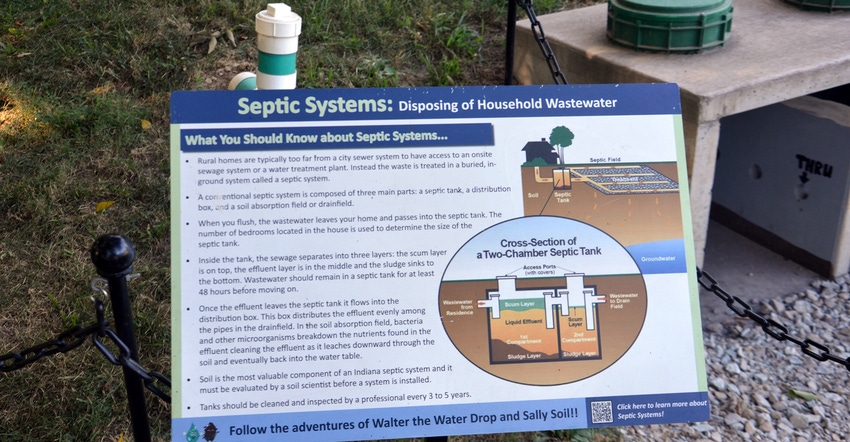
Few people worry if their toilet will flush … until it doesn’t flush. Gary Steinhardt, Purdue Extension soil scientist, says it’s better to think about and care for your septic system now instead of waiting until toilets back up.
“If you follow simple recommendations, you can extend the life of your septic system and delay costly repairs,” Steinhardt says.
Steinhardt, Purdue soils expert Jeff Bradford and Alice Quinn with the Indiana Department of Health prepared a brochure that will be distributed at the Pathway to Water Quality during the 2022 Indiana State Fair.
Here are 13 tips for maintaining your septic system from that brochure.
1. Become familiar with your on-site system. If you don’t know where your septic tank and septic field are located, find out now. Notice soft spots, wet areas, sewage smells and gurgling drains. These are signs of trouble that won’t improve with time.
2. Arrange a professional inspection to diagnose problems. The Indiana Onsite Wastewater Professionals Association keeps a list of on-site inspectors. If you suspect an issue, call an inspector before the problem becomes major. EPA suggests an inspection every three years.
3. Pump and clean the tank. Have your septic tank pumped and cleaned every three to five years. The more people in the home and the more water you use, the more often the tank should be pumped. Accumulation of sludge and fats, oils and greases in the tank can lead to early failure of your system.
4. Clean outlet filters. Newer septic systems have filters. Clean these filters at least every time the tank is cleaned and pumped. Consider hiring a professional to inspect and clean filters.
5. Minimize use of garbage disposers. Dispose of trash, including garbage and coffee grounds, in a trash can. Limit what you run through a garbage disposer. Those solids don’t decompose and can contribute to more frequent septic tank cleanout.
6. Put certain cooking products in the trash. The septic tank can’t treat flour, milk products, oil or cooking grease, so don’t put them down the drain.
7. Use caution with household chemicals. Bleach in concentrated form can negatively impact good bacteria in the septic tank.
8. Keep nondegradable products out of the commode. Otherwise, they add to sludge and scum in the septic tank.
9. Don’t flush “flushable” items. Flushable diapers and flushable wipes, cigarette butts, kitty litter, paper towels, feminine hygiene products and much more could plug up plumbing. Even if they don’t, they will float in septic tank scum.
10. Don’t flush prescription drugs. Drugs can also harm bacteria that break down septic waste.
11. Conserve water. Low-flow toilets, short showers and using less water overall help prolong a septic system’s life.
12. Fix water leaks immediately. Even a small water leak can add hundreds of gallons of unnecessary water to your septic system daily. Too much water can overwhelm the septic field.
13. Schedule water use carefully. Don’t wash clothes and shower at the same time. Too much wastewater will overwhelm any on-site sewage system.
About the Author(s)
You May Also Like




